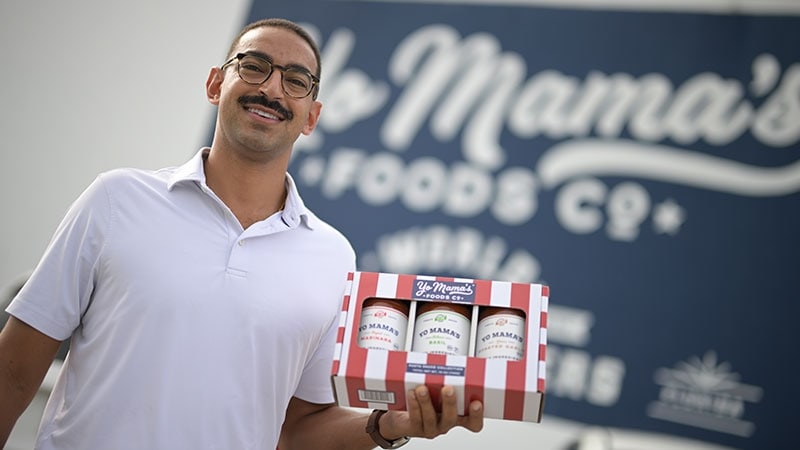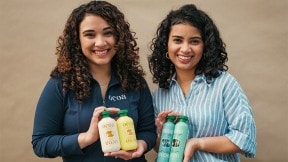Start small, then scale quickly
The secret to one entrepreneur’s success? He builds growth into his business model.

Participants compensated
Entrepreneur David Habib has turned a passion for all-natural cooking into a multinational business venture.
David Habib, of Yo Mama’s Foods, has managed to stay true to his values while scaling his business.
David Habib spent years logging long hours at a corporate job in Washington, D.C., before going into business for himself. He’d come home tired and hungry, only to feel defeated whenever he opened his fridge. He didn’t want to spend hours prepping and cooking dinner, but he didn’t want to skimp on taste or nutrition either.
That’s when his lightbulb moment came. There must be a lot of people like him, people who appreciated healthy, home-cooked meals but didn’t have enough time to make them from scratch. He figured they’d be interested in sauces and dressings packed with fresh, natural ingredients that could easily be incorporated into simple recipes. And so he decided to start selling his own under the moniker Yo Mama’s Foods, in honor of his own mother and her top-notch cooking.
The company quickly became a success. When we first wrote about Habib last year, Yo Mama’s products were available in 11,000 stores. Now Habib says that the products are in 24,000 stores around the world and counting. “Our goal is to keep on growing,” Habib says. “We want to be an international household brand.”
Treat every setback like an opportunity
Yo Mama’s has grown so quickly in part because Habib treats every business setback like an opportunity. For example, the company used to source glass from Taiwan. But when shipping rates skyrocketed as a result of supply chain issues, buying glass from overseas became too expensive.
So Habib decided to retool his supply chain and began to look for U.S.-based partners. “We started to knock on the doors of some of the larger companies,” he says. Eventually he contacted U.S. manufacturers who provide glass to many major brands. “Having the opportunity now to work with U.S. companies has allowed us to get better glass, get it sourced here in the U.S. and ultimately get it at the best price.”
Habib has never been afraid to make changes to his product offerings or his business strategy. In fact, he sees inflation as another catalyst to ensure that the company is “as efficient and optimized as possible.”
“Since the beginning, we’ve been doing something called ‘toll packing,’ where we took ownership of all the supplier relationships, and then the manufacturer was only responsible for cooking and packaging,” Habib says. “This increased our buying power, allowed us to develop supplier relationships early on and created a solid foundation for scaling the business.”
Diversify your suppliers
Another component of Yo Mama’s success is Habib’s proactivity. He doesn’t just wait for opportunities to land in his lap. He seeks them out.
Case in point: His team uses millions of pounds of tomatoes in its sauces each year. But because many of the tomatoes in the U.S. are grown in California and Yo Mama’s is based in Florida, Habib found himself shipping tomatoes from the West Coast to the East, just to be able to process them.
The logistics presented a problem — and an opportunity. The Yo Mama’s team started researching other places to buy tomatoes. “We learned that in the state of Florida, 800,000,000 pounds of Roma tomatoes are actually thrown away every single year,” Habib says. “They’re taken to fields and left to rot.”
When we last interviewed Habib, he and his coworkers had already begun to rescue some of those surplus tomatoes by striking up a partnership with a local supplier. Since then, they’ve been incorporating the local tomatoes into their recipes and conducting regular taste tests to make sure that the revamped product is just as fresh and tasty as the original. The new sauces will help reduce the company’s carbon footprint and save millions of pounds of fresh Roma Tomatoes.
Get strategic about spending
Habib’s commitment to capitalizing on opportunities extends to the way he finances his business. Because he’d been using a Chase credit card for his personal spending, when it came time to choose a credit card for his business, he again turned to Chase.
“Patrick at our Chase branch, he was really the one who took a chance on us,” says Habib, who first reached out shortly after launching Yo Mama’s. “We were a very small company, and I came to him and asked for a line of credit, and he was wise to probably not give us one then. But he did say, ‘You know what? If you open a business card, you can earn cash back.’” So Habib signed up for the card and has been using it ever since.
More recently, Habib also opened a Chase Ink Premier card. “We didn’t need another credit card, but when we saw that Chase offered an opportunity to earn [2.5%] cash back on purchases over $5,000, we opened that one very quickly,” he says. Habib finds the card’s cash back feature handy, especially when it comes to making bulk and raw purchases.
“I think what makes Chase such a winner for us is the user experience and the customer experience,” he says. “The overall cash back benefits are really well thought out.”
Never stop growing
Habib is happy with the current success of Yo Mama’s Foods. But he intends to keep looking for opportunities to improve his business. “Our goal is to be a household name,” he says.
And how does he plan to achieve that goal? By following the same plan that’s gotten him this far: think big, start small, and scale quickly.
“If you can execute well at a small scale, then you’re set up nicely to ultimately scale quickly,” he explains. “And by crafting the finest product through a blend of taste, design and profitability, the momentum of growth will naturally snowball as you continue to expand.”
Seek out expert advice
Want to hear more about how Chase could help you level up your own business endeavors? Speak with a Chase business banker today.



